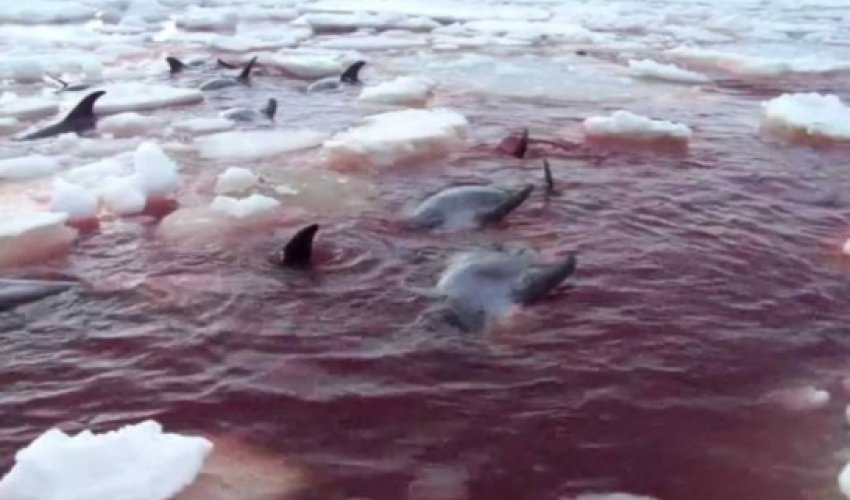White-beaked dolphins trapped in ice off the Canadian coast - VIDEO

The pod of 30 to 40 was discovered by residents of Cape Ray in the Canadian province of Newfoundland and Labrador on Sunday evening and reports are now emerging that all but three of the dolphins have died.Trapped by ice blown close to shore by strong winds, the amount of open water for the dolphins slowly decreased, inevitably enclosing these animals.The dolphins most likely died of internal injuries caused by ice pressure and suffocations under the ice.Resident Tommy Anderson spoke to local newspaper The Telegram early yesterday expressing his doubts over their survival: "The ice is in, and as far as you can see there's nothing but ice," he said."You can hear the sounds that they're making - talking to each other." Shocking footage released yesterday shows the last moments of a pod of white-beaked dolphins trapped in ice foundering in bloodied waters off the coast of Canada.The pod of 30 to 40 was discovered by residents of Cape Ray in the Canadian province of Newfoundland and Labrador on Sunday evening and reports are now emerging that all but three of the dolphins have died.Trapped by ice blown close to shore by strong winds, the amount of open water for the dolphins slowly decreased, inevitably enclosing these animals.The dolphins most likely died of internal injuries caused by ice pressure and suffocations under the ice.Resident Tommy Anderson spoke to local newspaper The Telegram early yesterday expressing his doubts over their survival: "The ice is in, and as far as you can see there's nothing but ice," he said."You can hear the sounds that they're making - talking to each other."Warning: graphic imagesSpeaking to CTV news the head of Whale Release and Strandings in Portugal Cove-St. Philip's N.L., Wayne Ledwell said: "It was expected because of the heavy ice pack and the strong winds that were forcing them on land".According to Ledwell the ice in the area was three metres thick and jagged on both sides."They can panic and die real quick when they're pushed onshore", he said.White-beaked dolphins arrive in the waters around Newfoundland as spring approaches.Weighing up to 300 kilograms, they are usually the first of the whales, porpoises and dolphins to arrive and as a result are the most prone to become trapped in the shifting ice.Although successful rescues have been carried out in the past, using snow mobiles and trucks to lift the animals and transport them to safety, strong winds and thick ice prevented a similar rescue attempt yesterday.A spokesperson for the Canadian federal Fisheries Department Larry Vaters said: "Situations when marine animals become trapped in ice are very unfortunate, but do occur in the marine ecosystem - especially when ice conditions are extreme - and should be left to take their course in most circumstances," he wrote in an email.Local records indicate that around 400 whale, dolphins and porpoises have become trapped in the surrounding ice of Newfoundland since the 1970s. (independent.co.uk)ANN.Az




































 Photo
Photo 



 Video
Video 

